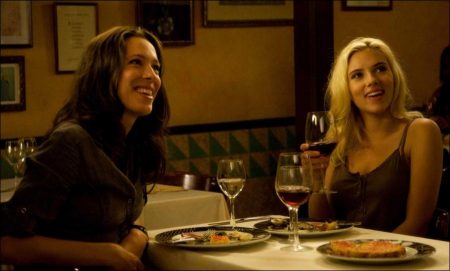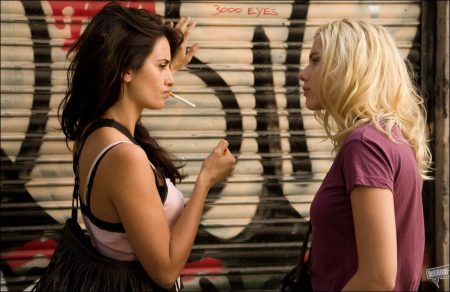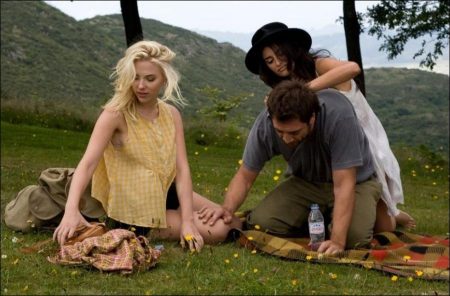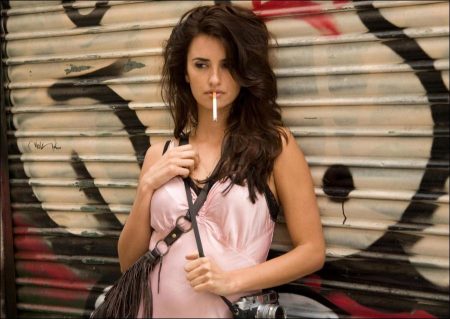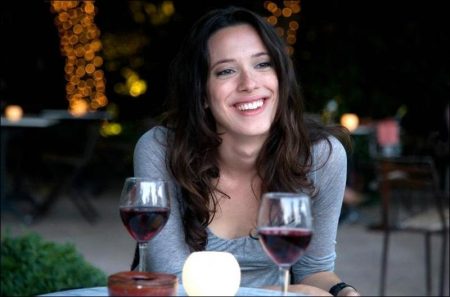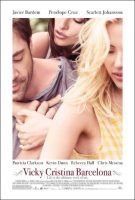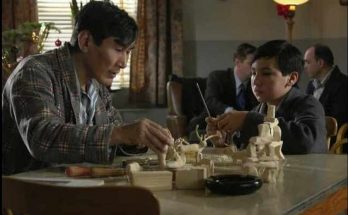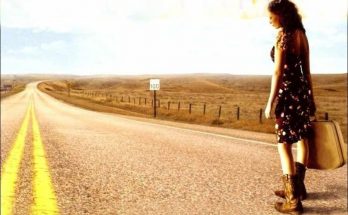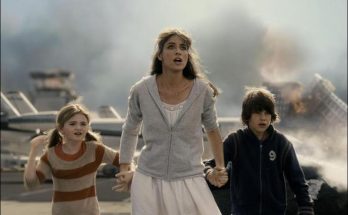Vicky Cristina Barcelona Movie Trailer. The two worlds of the film collide when Juan Antonio approaches Vicky and Cristina in a restaurant with a proposal in his signature direct style: accompany him to the small Asturian town of Oviedo, where they will take in the local sights, eat and drink well, and all make love. “Vicky’s thinking, ‘Who is this horrid European artist sleazeball cliché?'” says Hall. “She wants to get Cristina away from him as quickly as possible.” But as the story reveals, Vicky is mistaken in her judgment of Juan Antonio. He is a very unusual man and his offer is not the crude come-on it first appears to be.
“Juan Antonio is truly overwhelmed by their beauty and their personalities,” says Bardem, “and he tries to create a different kind of relationship between the three of them. Sexuality is a very important experience for him, but it’s not the end-it’s the beginning of something much more important. He really has a different way of perceiving life. I guess from an ethical point of view that’s not fair to everybody, but Juan Antonio’s ethics are different from what some people might expect, and that’s one of the keys to this story.” Bardem and Allen agree. “He’s thinking with no guile,” says Allen. “He’s a very decent guy and to him, lovemaking is just one part of life. A nice part of life.”
While in Oviedo, Juan Antonio intuits that Vicky may not be clear-headed as she presents herself. “Vicky is seemingly together,” says Hall, “but she’s a little too vehemently ‘together,’ a little bit ‘the lady doth protest too much.’ She’s capable of wanting all sorts of things which are much more romantic and wild, but it’s hard for her to take risks because she has always been very in control and she doesn’t trust herself when things are outside her control. She doesn’t know how crazy she might go.”
Allen believes that Vicky has difficulty with too much freedom. “She might flirt now and then with doing something more adventurous, but what she really wants is the safety of a less risky formula existence.” Hall thinks Vicky’s plight expresses one of the larger questions the film is posing about love. “I think Woody’s looking into the tension between the fantasy-land of love and the real world,” she says. “The things you live with as opposed to the things you dream about. And then what happens when your fantasies intrude on your ‘real world.'”
In this film, as he has done since ANNIE HALL, Allen explores the success and failure of relationships through the psychology of the characters, rather than through the external devices of formulaic Hollywood love stories. “People are very complicated and relationships are very hard to sustain because people have incredibly detailed needs,” says Allen. “And if these needs are not met, you get annoyed. It’s exactly like Juan Antonio says in the movie, if there’s one element missing, it can be like salt or something from your diet-you’ve got your Vitamin A and C and Niacin and Iron-but if you don’t have some tiny little element, it can kill you.
It could also be an added element that changes the chemistry, like the presence of a sibling, a mother, a best friend, a boss, a shrink, or a change of occupation. In the case of Juan Antonio and Maria Elena, the two of them fight like cats and dogs all the time even though they are passionately crazy about each other. But the presence of Cristina in the chemical equation somehow makes it possible for their relationship to work. They channel enough of their affection to Cristina and Cristina to them, and Cristina drains off some of the anger and irritation or makes it less heated.”
Of the trio, Scarlett offers “I think they see in one another what they don’t like to see in themselves, and Cristina provides a buffer for them. When they love her together it allows them to appreciate one another without having their relationship combusting.” “For Maria Elena it’s totally natural and normal to live with two people at the same time,” says Cruz. “And inside a situation that is not common, she feels safe. Because she’s so full of contradictions, it makes sense for her. It’s a very peculiar way of thinking: she doesn’t see Cristina as a threat for her relationship with Juan Antonio, she thinks Cristina brings balance into their relationship.”
Allen teams for the third time with Scarlett Johansson, after MATCH POINT and SCOOP. “Every now and then in my professional life, I find an actress with the kind of gift that inspires me to create parts for,” says Allen. “She’s very smart, sexy, very gifted, and with a big range. And she’s lightning fast with her sense of humor and is a phrase-maker which always impresses me.” “I think Woody and I have a very similar sensibility and sense of humor certainly, and when I read his scripts I feel very connected to them,” says Johansson. “I think we just appreciate each other as artists and we enjoy working together because we’re always laughing and having a good time. It’s wonderful to be able to work with your friends, and I think that’s why we keep doing it.”
Allen had never seen Penélope Cruz in a film until he saw her Oscar-nominated performance in Pedro Almodovar’s VOLVER. “I just thought she was amazing,” he says. “And of course I couldn’t wait to get her for my movie. And then her agent called and said Penelope knew I was doing a movie in Spain and she called and said she knew I was doing a movie in Spain and wanted very much to be a part of it. To me, that was the greatest thing I could hear. Maria Elena is a force of nature, and that’s what Penélope is. She’s beautiful and amazingly sexy in a way that no other woman in the world is-a very special kind of beauty. And she’s a tremendous actress and she conveys it. Of course it’s overwhelming.”
Javier Bardem, a recent Academy Award-winner for NO COUNTRY FOR OLD MEN, joined the cast as the flamboyant Juan Antonio. “He was maybe the only actor in the world who could have done this role for me,” says Allen. “I needed a Spaniard who was sexy without being movie actor conventional pretty, but deeper than that. I’ve seen him in movies, and I thought he was just the greatest. I was thrilled to work with him-I didn’t know that that would ever happen in my life.”
For the role of Vicky, Allen looked for someone who had a contrasting personality to Johansson and Cruz. “[Casting Director] Juliet Taylor said you’ve got to meet Rebecca Hall,” says Allen. “And as soon as I saw her I thought she was right. Rebecca has got a real beauty and dignity to her, and of course she’s a wonderful actress.”
Patricia Clarkson, another Academy Award nominee, plays Judy, Vicky and Cristina’s host in Barcelona. “She is again another example of where I got the chance to work with an actress that I’ve loved for a long time,” says Allen. “Judy represents the direction that Vicky could go eventually, when you get married to a safe guy and don’t take the risk. If she had to do it over again, she would not have made that choice, or would she?”
While the actors (aside from Allen regular Johansson) felt a bit nervous about working with a filmmaker they admire, he soon set them at ease. “He is such a nice man,” says Bardem. “Every time I needed him, he gave me the right answer, a very helpful answer for me to really understand what I had to do. And working with Woody Allen is like having jewels in your mouth. The dialogue is so brilliant and so very helpful for any actor to move ahead and find the reason of the scene through the words.”
“With somebody else I would have been scared to play a character that approaches every situation with the same level of energy,” says Cruz. “When you have a character that is so extroverted and so loud and brings so much chaos, I think, maybe because of fear, I wanted to do some of the scenes a little bit quieter. And I tried a couple of times to make things smaller and he said, ‘No, she lives in that state permanently.’ He gave me a clear direction-‘Be brave!’-and I think he was completely right about that.”
Allen decided to enlist a narrator (Christopher Evan Welch) to comment throughout the action of “”Vicky Cristina Barcelona”” as it unfolds. “The story has the quality of a tale,” he says. “It’s the story of what happens to these two girls in the summer. And I thought somebody should just relate it, and it would work that way. And it would save me a lot of boring expositional scenes, and the story could be moved quickly forward or in any way I wanted, by the narrator effortlessly.”
The jaunty tone of “”Vicky Cristina Barcelona”” is set by Giulia y Los Tellarini’s catchy song “Barcelona,” which plays often in the film. The tune found its way to Allen serendipitously. “People send me music all the time, but I rarely get a chance to listen to anything. One morning, as I was running out to go to the set, I grabbed it without even opening it and listened to it in the car on the way to the location. And I said, ‘Hey, this is great! This is exactly what I want for the movie!’ And it worked out well for everyone. They were grateful we were using their music, and my producer was happy that we weren’t using something that would cost a lot of money like a George Gershwin song!”
All the shooting took place in Barcelona, the capital of Catalonia and Spain’s second largest city, on the Spanish east coast of the Mediterranean, as well as in Oviedo and Avilés, two cities in the Principality of Asturius on the north coast (approximately 400 miles away). The Barcelona locations are a virtual postcard of the city, notably the fantastically intricate architecture of Antoni Gaudí, including his famous Sagrada Familía, Parc Güell, and La Pedrera. One particularly memorable moment in the film is when Javier Bardem and Rebecca Hall play out an entire scene from opposite sides of a mosaic lizard fountain in the Parc Güell. “We had to tamp down the amount of water flowing out of the lizard’s mouth,” says Allen. “You couldn’t hear the dialogue!”
Other notable Barcelona sites include the Tibidabo Amusement Park, Hospital de Saint Pau, Fundació Joan Míro (The Míro Museum), Museu Nacional d’Art Catalunya, Port Olímpic, the Barcelona Airport (with its Míro wall mural), and La Rambla. “Barcelona has all the elements of a great European city in terms of beautiful architecture, but there’s also something underneath the surface that is quite anarchic,” says Hall. “The moment I got there I was staying up much later and going out and partying much more than I ever do anywhere else (on weekends, not work days, let it be known!). It’s got a really strong spirit as a city and the people there are very proud of it-they like to define themselves as outside of Spain. It stands on its own with its unique culture and identity.”
Gaudí’s fervid architecture is a constant touchstone for the movie. His life’s work, the spellbinding Sagrada Familía church, is one of the most celebrated unfinished works in art, and as such, is a supremely romantic building. It echoes Maria Elena’s belief that only unfulfilled love is truly romantic.
“Denis de Rougemont wrote that once love is fulfilled, it’s never romantic again,” says Allen. “I think it can then have other qualities that lead one to a wonderful life, but it never has that romance.” “I think there are many different kinds of ‘romantic,'” says Johansson. “There’s a romance that’s very seductive and part of the kind of mating game, and then there’s a deep romance of people who have been together for thirty years and still surprise one another, and are still learning about each other. I think that’s terribly romantic.”
“I think the film shows many kinds of love,” says Johansson, “whether it’s Maria Elena and Juan Antonio having this interminable, impossible sort of love or whether it’s the love that Cristina has for Maria Elena and Juan Antonio, a sort of infatuation and an artistic expression of love. And Vicky’s feelings for Juan Antonio are a very obsessive, fanatical kind of love. I think the film shows that all kinds of love are valid.” “I think there are different aspects of love,” says Bardem. “Love is as different as the people who feel it. I’d say I guess the movie wants to show some of those relationships with love in different people, different minds.”
Allen thinks that “”Vicky Cristina Barcelona”” may say things about love that even he isn’t aware of. “I have no profound things to say about love but by creating live characters, and having them interact, inferences can be made by people” he says. He continues, “there are probably things in the final film that are in spite of what I hoped to say-they may even contradict what I had on my mind, which is not that deep. On the other hand, I did have some points to make. Some things work for some people in some situations. One can’t preconceive these things and one has to be more flexible when it comes to love.”
Vicky Cristina Barcelona (2008)
Directed by: Woody Allen
Starring: Javier Bardem, Patricia Clarkson, Penelope Cruz, Kevin Dunn, Rebecca Hall, Scarlett Johansson, Chris Messina, Maurice Sonnenberg, Christopher Evan Welch, Patricia Clarkson
Screenplay by: Woody Allen
Production Design by: Alain Bainée
Cinematography by: Javier Aguirresarobe
Film Editing by: Alisa Lepselter
Costume Design by: Sonia Grande
Set Decoration by: Sol Caramilloni, Sylvia Steinbrecht
Art Direction by: Iñigo Navarro
MPAA Rating: PG-13 for mature thematic material involving sexuality.
Distributed by: The Weinstein Company
Release Date: August 15 2008
Views: 176
